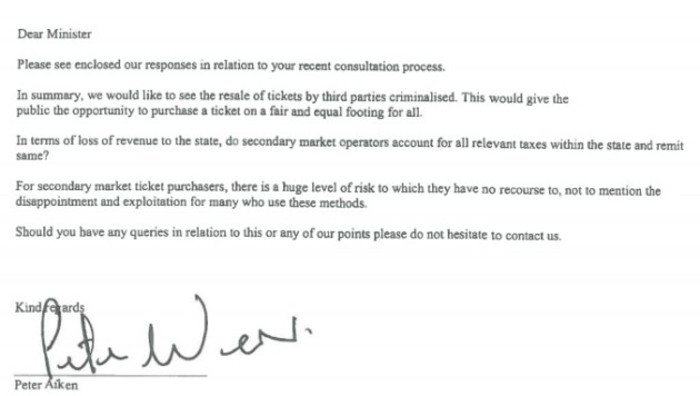Ticketmaster blames media 'sensationalism' for public outrage over ticket touting
But some event promoters say for-profit ticket resales should be criminalised.
TICKET RESALE WEBSITE Seatwave has hit back against proposed legislation that would make it illegal to resell tickets for a profit of more than 10%.
The planned laws would ensure that those looking to sell tickets for exorbitant prices will have the profits from those sales eradicated by fines. Breaches of the 10% resale limit will result in fines of up to €5,000.
The bill, which is not being opposed by government, has been put forward by Sinn Féin TD Maurice Quinlivan.
More than 24 interested parties made submissions to the public consultation, which was undertaken in response to concerns about tickets being resold at prices well in excess of their face values.
Two of the submissions were from Seatwave and Ticketmaster Ireland, which share the same parent company, Live Nation Entertainment.
Sold-out gigs
Seatwave, which was acquired by Ticketmaster in November 2014, allows fans who missed out on sold-out gigs to purchase official tickets.
It allows fans to sell their tickets, even within minutes of purchase, and charges a 10% ‘success fee’ on sales. It also allows customers to set their own selling price.
The company came in for criticism earlier this year when U2 tickets, which sold out within minutes on Ticketmaster, subsequently popped up on Seatwave for thousands of euro.
However in its submission to the public consultation, Seatwave said that it strongly believes the introduction of legislation to regulate the ticket resale market “will be both ineffective and will, in fact, be detrimental to Irish fans”.
“In Ireland, the ticket resale market used to take place underground or offshore – out of reach of any consumer protection,” it said.
The company cites a number of other countries that have introduced legislation to the same effect.
Seatwave said when Belgium implemented legislation in 2013 that strictly prohibited fans from reselling tickets at a higher price than the original sale value, the company closed its site.
“There is often rhetoric in the media that the resale market is broken, but this is not the case,” it said.
“The resale market is an example of an efficient market with ticket prices clearing at their market level. Event organisers can look to the resale market to give them an indication of how they should be pricing their tickets.”
‘Media frenzy’
Ticketmaster Ireland said in its submission that there had been a “media frenzy” around ticket resales that didn’t accurately represent the tiny proportion of tickets that made it onto the secondary market.
The coverage of the increase in ticket sale prices on resale sites “only served to confuse the public and sensationalise the issue”, according to Ticketmaster.
Ticketmaster denied that it has ever placed tickets directly onto the resale market, adding that there is “no evidence to support the view that any of our clients are placing tickets directly onto the resale market”.
“Our data shows that less than 1% of the tickets that Ticketmaster Ireland sells on behalf of its clients are subsequently resold – a vastly different story to what is told in the Irish press.”
Bodies such as the Football Association of Ireland (FAI), Done Deal, the GAA, Toutless, and a number of TDs also made submissions, with many of them in favour of new legalisation.
Aiken Promotions
One of Ireland’s top promoters, Peter Aiken made the following submission, which called for third-party ticket sales to be criminalised:

The FAI said it believed “it would be helpful for legislation to be introduced in this area in order to combat the sale of tickets by persons who purchase tickets with no intention of ever attending the event but who resell the tickets at a significant profit”.
Meanwhile, the GAA also said ticket touting should be classified as a criminal activity. It said the current legislation “in no way reflects the technological developments of recent decades”.
“It does not act as an incentive for the civil authorities to challenge the on-street touting at our fixtures or extortionate pricing on on-line sites. Any change to the current legislation would help protect consumers, our members and the organisation.”
While many of the sporting bodies seemed to be in favour of the law change, the Irish Rugby Football Union (IRFU) said it would reserve its position on the proposal of new legislation.
Quinlivan called for cross-party support for his bill stating that it will benefit event-goers and organisers alike.
“Ticket touting has escalated in recent years. With advances in technology, the practice has grown from traditional touts selling counterfeit, cancelled or extortionately priced tickets outside venues, to online sites, in the grey of regulation,” he said.
This is not the first bill to be proposed to deal with the overpricing of tickets. Similar laws were proposed by Fine Gael TD Noel Rock and Fianna Fáil’s Stephen Donnelly some months ago.
While Sinn Féin’s bill was selected by a lottery to be allowed to proceed, in a rare event for government it has decided to support a bill from another party, despite having its own legislation in the works.
The Competition and Consumer Protection Commission has launched a separate investigation into suspected anti-competitive conduct in the ticketing industry.
Written by Christina Finn and posted on TheJournal.ie
Sign up to our newsletter to receive a regular digest of Fora’s top articles delivered to your inbox.






